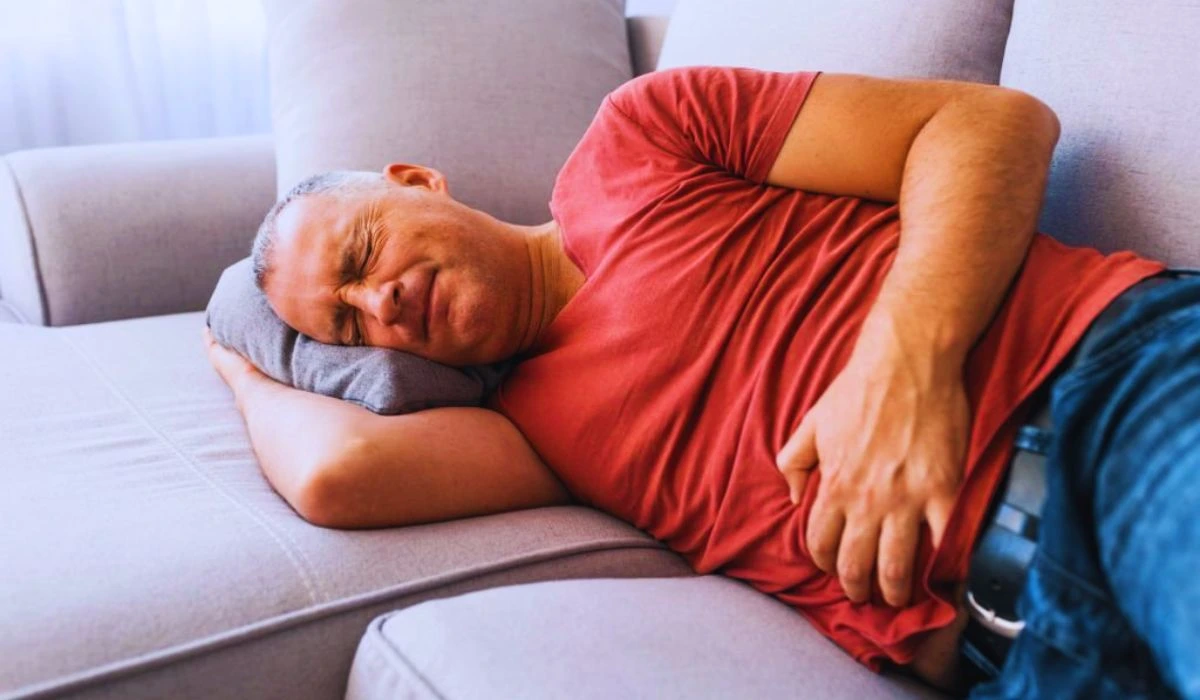A hernia occurs when an organ or fatty tissue squeezes through a weak spot in a surrounding muscle or connective tissue called fascia. Hernias often occur in the abdomen, most commonly in the groin (inguinal hernia), belly button (umbilical hernia), or hiatus (hiatal hernia).
Men are much more likely to get a hernia than women, especially inguinal hernias. About 25% of men will develop an inguinal hernia during their lifetime. Understanding the causes, symptoms, and treatments for hernias can help men identify and manage this common condition.
What Are The Causes Of Hernia In Men?

There are several factors that can increase a man’s risk of developing a hernia:
- Weakened abdominal muscles – Repeated strain on the abdominal muscles from heavy lifting, coughing, constipation, or urination can cause the muscles to weaken over time. Weakened muscles are more likely to tear or split.
- High intra-abdominal pressure – Increased pressure inside the abdomen from obesity, pregnancy, frequent straining during bowel movements, or fluid in the abdomen can push against weakened areas and cause a hernia.
- Prior surgeries or injuries – Previous surgical incisions or injuries/trauma to the abdominal muscles can leave weak spots. Hernias may develop around these sites.
- Family history – Some people are just born with weaker abdominal tissues that make them prone to hernias. Having a close relative with a hernia increases your risk.
- Age – The tissues, muscles, and fascia lose strength as people get older. Most hernias in men occur after age 40.
- Chronic cough – Coughing puts a lot of pressure on the abdomen. Men with chronic lung conditions like COPD are at higher risk.
- Strenuous activities – Weightlifting, football, heavy exercise, or any strenuous activity that causes abdominal strain can stress the fascia.
Also Check: How Do Kidney Stones Affect Urine? Causes, Symptoms & Prevention
Symptoms Of Hernia In Men
Some hernias cause no symptoms at all and are only discovered during a routine medical exam. The most common symptoms of a hernia include:
- A noticeable bulge in the abdomen or groin is the most obvious sign of a hernia. Coughing, straining, or standing may make the bulge more prominent.
- Pain and discomfort – The bulge may ache, especially with activities like lifting, bending over, or exercise. Inguinal hernias can cause pain in the scrotum.
- Weakness and pressure – Some men feel weakness, heaviness, or a dragging sensation in the groin.
- Reducible bulge – In many cases, the hernia bulge can be gently pushed back in when lying down. However, other times the hernia gets “stuck” in place.
- Constipation or difficulty urinating – Large hernias can obstruct the bowel or bladder.
A hernia will not get better on its own. Even asymptomatic hernias can become painful, trapped, or strangulated (loss of blood supply) without treatment. Seeking medical care is essential.
Treatments For Hernia In Men
Several treatment options exist for hernias. The best approach depends on the hernia’s size and location.
- Watchful waiting – Small, minimally symptomatic hernias may simply be monitored at first. Using a truss to support the area may help manage discomfort.
- Medications – Over-the-counter pain relievers like acetaminophen (Tylenol) or ibuprofen (Advil) can provide relief from hernia discomfort.
- Surgery – Most hernias ultimately require surgical repair, significantly if they are growing larger or causing problems. Traditional open surgery uses a larger incision, while laparoscopic surgery uses smaller incisions and a camera. Mesh is often used to patch weakened muscle tissue.
- Lifestyle changes – Losing weight, modifying strenuous activities, managing cough/constipation, and avoiding heavy lifting can prevent hernia recurrence after surgical repair. Physical therapy can also help strengthen the abdominal muscles.
Conclusion
Hernias are very common in men due to frequent intra-abdominal straining, collagen deficiencies, and weakened abdominal wall muscles. Typical symptoms include an abdominal/groin bulge, pain, discomfort, and heaviness.
While small hernias may be observed, most require surgical repair, especially if the hernia is stuck, strangulated, or causing impairment. Following surgery, lifestyle changes are recommended. Seeking medical care can ensure appropriate treatment and prevent life-threatening complications from untreated hernias.
FAQ
A: The most common types of hernias in men are inguinal (inner groin), umbilical (belly button), and hiatal (stomach). Inguinal hernias are by far the most prevalent, accounting for 75% of all hernias and occurring up to 25 times more often in men.
A: In some cases, very small hernias may go away on their own over time. However, the vast majority of hernias will not go away without surgical treatment. Leaving a hernia untreated can lead to potentially serious complications like bowel obstruction, strangulation, and tissue death.
A: Strenuous activities that increase abdominal pressure should be avoided with a hernia. These include heavy lifting, straining during bowel movements, bending, coughing, exercise, and weightlifting. Using proper body mechanics and modifying activity can help prevent the worsening of the hernia.
A: Unlike abdominal wall hernias, hiatal hernias involve the stomach protruding through the diaphragm muscle into the chest. Treatment focuses on managing reflux symptoms with medication and dietary changes rather than surgical repair. Only very large, problematic hiatal hernias need surgical intervention.
A: Preventive measures include maintaining a healthy weight, eating a high-fiber diet to avoid straining during bowel movements, avoiding heavy lifting by using proper techniques, stopping smoking, managing chronic coughs, and doing exercises to strengthen abdominal muscles. Avoiding high intra-abdominal pressure is vital.

